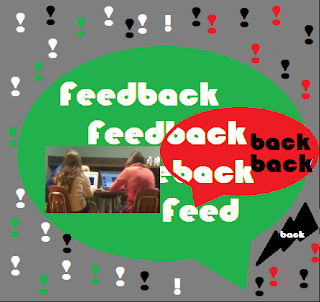REVISITING EVALUATION: The Flip Side of Continuous Feedback
It has been that time of the year again. All dread it, managers and employees alike: annual review time!
Granted, there have already been quite a few changes in many organizations. It has come gradually, in the forms of chats, mentoring, different forms of on-boarding, engagement initiatives, and the sort. We are talking about continuous feedback. The bottom line was to bring changes in performance results and in evaluation. In the eyes of the organization, it works! It is better, right?
But what if instead of delivering a performance review you get one of your own from a member of your staff? Impossible? Unrealistic? Think twice about it.
Continuous feedback breaks up the barrier of silence. This is not meant to be negative. However, in some situations, it brings up the toxicity of negativity to the surface. What are the odds? Well, maybe this is a flip side of continuous feedback: open communication!
Employees will keep quiet out of respect, or fear of retaliation, but when stress becomes overwhelming and they don't have anything else to lose from their own perspective, they will let it out. And I mean it in its true sense: it will be a deluge of words of hard truth. Never in my wildest dream I thought that such thing as a crude feedback could happen. Hang on tight: it DOES happen!
This is the true world: people are human. Although "errare humanum est" (talking about the manager, here), one (employees in this case) cannot continuously be or feel demeaned or mistreated on a consistent basis. We all have seen and known cases where the issue is brought up to HR one way or another. What if the employee just gives you that honest, deep, crude feedback and will never address anyone else on the hierarchy about it?
My only hope would be that the concerned manager would correct him/herself, for his/her own sake.
Keep quiet? Ignore it? Feel defeated? Retaliate? (ah! No!) Soften up? I honestly think that there are two possibilities: a) you might be dealing with an employee who is negative by nature and is fuelled by negativity building; or b) you could be facing some hard truth-telling, no matter the state of mind or psychology of the employee. The lesson is not to entirely dismiss the criticism. However, don't let it defeat you! Instead, use it as a stepping stone to self-improvement. We all learn from negativity. Forget about the delivery of the feedback you received: think self-assessment and improvement. Of course, easier said than done.
One thing is sure: learning about such situations has brought me down to earth! There is such a gap between theory, possibilities, and reality! Boom!! We do encourage conflict resolution at the managerial level. We do encourage feedback. But oh! so much can and do happen up and downhill!
Food for thought should also be the coaching method and styles of managers. Whereas areas of evaluation are uniform, managers are individuals. In sum, whether we like to admit it or not, they are very possibly subject to bias. It could be a bias due to a recent event, such as a remark or simple observation, or likes and dislikes, or even spur of the moment. Let alone the adjustment to this new method of evaluation: it takes more time and more involvement. Designed to ensure consistency and better accuracy and effectiveness, this new method could very possibly create a sense of increased "to do" to some. Also, although transitioning to this new method, not all companies have fully eliminated the numeric ranking following Texas Roadhouse example. The possible impact of that increased sense of burden, along with perduring biases will negatively affect the year-end result for employees: the dreaded performance review. And for good reasons in the case! Another flip side of continuous feedback ...
The best thing HR can do is to be a strong and knowledgeable support system to managers. But for the purpose, we also need to be alert and in touch with reality. While micro-managing is out of the question, it does not hurt to have a pulse take once in a while, a touch base with realities. And I do mean REALITY CHECK. Don't rely on reports , verbal or emails, or whatever else. Don't rely on "biased" interpretations and chats from managers : we need to double-check for ourselves, go out there to see the work done and/or to get done, and avoid bad surprises and potential lawsuits!
Managers need training more than ever to safeguard the effectiveness of the new review system. By the same token, they also need HR support. We are all partners in defeating toxicity and negativity in the workplace. Toxicity and negatively do not fuel themselves. They can be fuelled by minor incidents or general attitude, managerial styles, teamwork or lack of. After all, human capital is major in any organization, and bringing out the best of it in many facets is what is HR about.
 |
| © Ad_HRComatrix_Review |
But what if instead of delivering a performance review you get one of your own from a member of your staff? Impossible? Unrealistic? Think twice about it.
Continuous Feedback Breaks up The Barrier of Silence.
Continuous feedback breaks up the barrier of silence. This is not meant to be negative. However, in some situations, it brings up the toxicity of negativity to the surface. What are the odds? Well, maybe this is a flip side of continuous feedback: open communication!
Employees will keep quiet out of respect, or fear of retaliation, but when stress becomes overwhelming and they don't have anything else to lose from their own perspective, they will let it out. And I mean it in its true sense: it will be a deluge of words of hard truth. Never in my wildest dream I thought that such thing as a crude feedback could happen. Hang on tight: it DOES happen!
This is the true world: people are human. Although "errare humanum est" (talking about the manager, here), one (employees in this case) cannot continuously be or feel demeaned or mistreated on a consistent basis. We all have seen and known cases where the issue is brought up to HR one way or another. What if the employee just gives you that honest, deep, crude feedback and will never address anyone else on the hierarchy about it?
My only hope would be that the concerned manager would correct him/herself, for his/her own sake.
So, What's a Manager To Do in That Case?
Keep quiet? Ignore it? Feel defeated? Retaliate? (ah! No!) Soften up? I honestly think that there are two possibilities: a) you might be dealing with an employee who is negative by nature and is fuelled by negativity building; or b) you could be facing some hard truth-telling, no matter the state of mind or psychology of the employee. The lesson is not to entirely dismiss the criticism. However, don't let it defeat you! Instead, use it as a stepping stone to self-improvement. We all learn from negativity. Forget about the delivery of the feedback you received: think self-assessment and improvement. Of course, easier said than done.
One thing is sure: learning about such situations has brought me down to earth! There is such a gap between theory, possibilities, and reality! Boom!! We do encourage conflict resolution at the managerial level. We do encourage feedback. But oh! so much can and do happen up and downhill!
Bias Has Not Gone Away...
Food for thought should also be the coaching method and styles of managers. Whereas areas of evaluation are uniform, managers are individuals. In sum, whether we like to admit it or not, they are very possibly subject to bias. It could be a bias due to a recent event, such as a remark or simple observation, or likes and dislikes, or even spur of the moment. Let alone the adjustment to this new method of evaluation: it takes more time and more involvement. Designed to ensure consistency and better accuracy and effectiveness, this new method could very possibly create a sense of increased "to do" to some. Also, although transitioning to this new method, not all companies have fully eliminated the numeric ranking following Texas Roadhouse example. The possible impact of that increased sense of burden, along with perduring biases will negatively affect the year-end result for employees: the dreaded performance review. And for good reasons in the case! Another flip side of continuous feedback ...
What Can and Should HR Do?
The best thing HR can do is to be a strong and knowledgeable support system to managers. But for the purpose, we also need to be alert and in touch with reality. While micro-managing is out of the question, it does not hurt to have a pulse take once in a while, a touch base with realities. And I do mean REALITY CHECK. Don't rely on reports , verbal or emails, or whatever else. Don't rely on "biased" interpretations and chats from managers : we need to double-check for ourselves, go out there to see the work done and/or to get done, and avoid bad surprises and potential lawsuits!
Managers need training more than ever to safeguard the effectiveness of the new review system. By the same token, they also need HR support. We are all partners in defeating toxicity and negativity in the workplace. Toxicity and negatively do not fuel themselves. They can be fuelled by minor incidents or general attitude, managerial styles, teamwork or lack of. After all, human capital is major in any organization, and bringing out the best of it in many facets is what is HR about.






Comments
Post a Comment